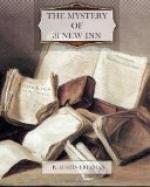Mr. Winwood roused himself for an instant, barked out the one word “Facts,” and shut himself up again with a snap.
“You would like to have the new facts by themselves?” said Thorndyke.
“If you please. The facts only, in the first place, at any rate.”
“Very well,” said Thorndyke; and here I caught his eye with a mischievous twinkle in it that I understood perfectly; for I had most of the facts myself and realized how much these two lawyers were likely to extract from them. Winwood was going to “have a run for his money,” as Thorndyke had promised.
My colleague, having placed on the table by his side a small cardboard box and the sheets of notes from his file, glanced quickly at Mr. Winwood and began:
“The first important new facts came into my possession on the day on which you introduced the case to me. In the evening, after you left, I availed myself of Mr. Stephen’s kind invitation to look over his uncle’s chambers in New Inn. I wished to do so in order to ascertain, if possible, what had been the habits of the deceased during his residence there. When I arrived with Dr. Jervis, Mr. Stephen was in the chambers, and I learned from him that his uncle was an Oriental scholar of some position and that he had a very thorough acquaintance with the cuneiform writing. Now, while I was talking with Mr. Stephen I made a very curious discovery. On the wall over the fire-place hung a large framed photograph of an ancient Persian inscription in the cuneiform character; and that photograph was upside down.”
“Upside down!” exclaimed Stephen. “But that is really very odd.”
“Very odd indeed,” agreed Thorndyke, “and very suggestive. The way in which it came to be inverted is pretty obvious and also rather suggestive. The photograph had evidently been in the frame some years but had apparently never been hung up before.”
“It had not,” said Stephen, “though I don’t know how you arrived at the fact. It used to stand on the mantelpiece in his old rooms in Jermyn Street.”
“Well,” continued Thorndyke, “the frame-maker had pasted his label on the back of the frame, and as this label hung the right way up, it appeared as if the person who fixed the photograph on the wall had adopted it as a guide.”
“It is very extraordinary,” said Stephen. “I should have thought the person who hung it would have asked Uncle Jeffrey which was the right way up; and I can’t imagine how on earth it could have hung all those months without his noticing it. He must have been practically blind.”
Here Marchmont, who had been thinking hard, with knitted brows, suddenly brightened up.
“I see your point,” said he. “You mean that if Jeffrey was as blind as that, it would have been possible for some person to substitute a false will, which he might sign without noticing the substitution.”
“That wouldn’t make the will a forgery,” growled Winwood. “If Jeffrey signed it, it was Jeffrey’s will. You could contest it if you could prove the fraud. But he said: ‘This is my will,’ and the two witnesses read it and have identified it.”




